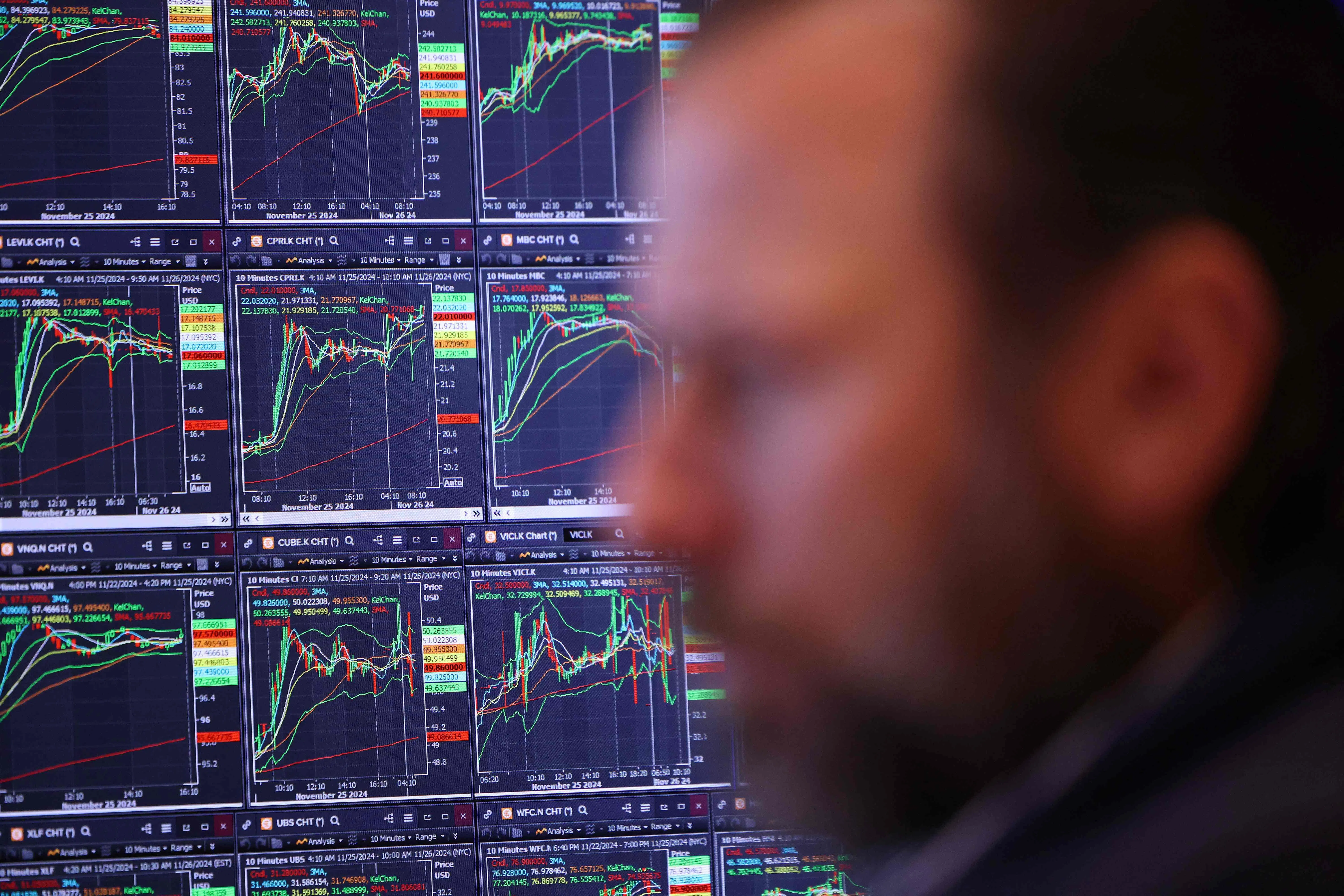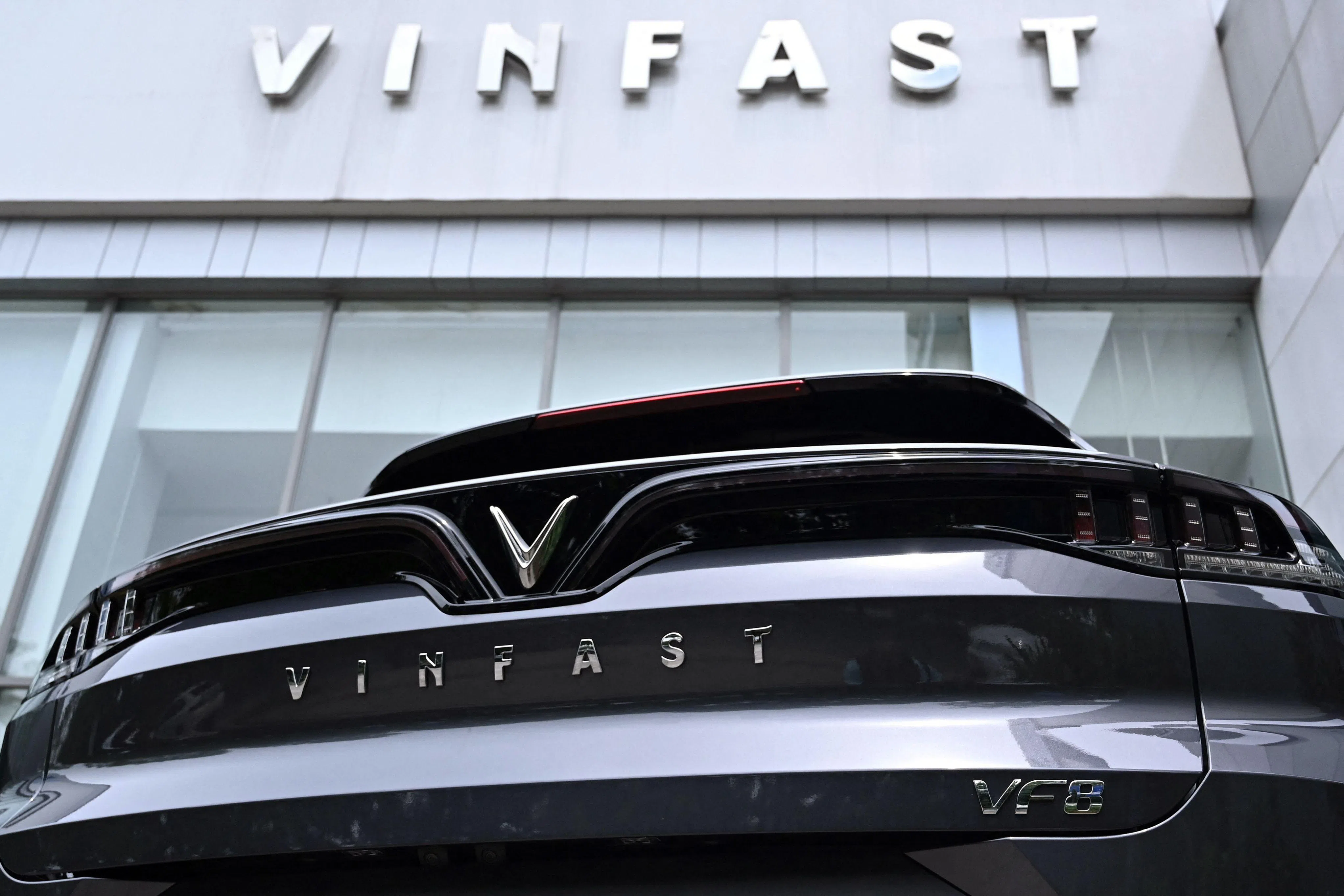The stock market’s growth engine is running on fumes.
For years, investors have counted on the biggest technology companies to power equity indexes higher based on their strong earnings and expectations for even more profits in the future, most recently fuelled by the development of artificial intelligence (AI) services. Those days appear to be over, at least for now. And it’s forcing investors to think of other ways to play the latest equities bull market as it enters its third year.
The issue is profits. The Magnificent Seven tech giants – Alphabet, Amazon.com, Apple, Meta Platforms, Microsoft, Nvidia and Tesla – are expected to post a combined earnings increase of 18 per cent in 2025, down from a projected 34 per cent for 2024, according to data compiled by Bloomberg Intelligence. Strip out Nvidia, arguably the biggest beneficiary of Wall Street’s AI mania, the rest of the group is expected to post a measly 3 per cent increase in profits in 2025.
An 18 per cent profit expansion is good news for just about any sector but Big Tech. Should the estimate come to fruition, the high-flying cohort will fall behind healthcare in full-year earnings growth and not significantly above the materials and industrials groups.
Meanwhile, the S&P 500 Index’s earnings growth is projected to reach 13 per cent in 2025, up from 10 per cent this year. In other words, the tech giants are no longer setting the pace for Corporate America.
“The Mag Seven is not necessarily going to be the engine of growth for the market that it has been for the last year or so,” said Julian McManus, portfolio manager at Janus Henderson.
BT in your inbox
Start and end each day with the latest news stories and analyses delivered straight to your inbox.
Leaving tech
Investors are already responding. In the week through Dec 4, the information technology group had its largest outflow in six weeks at US$1.4 billion, according a Bank of America note on Friday (Dec 6) citing data from EPFR Global. Small-cap stocks, which have been trailing the broader market this year, had US$4.6 billion of inflows, putting them at an annualised record high of more than US$30 billion.
McManus said he’s watching for upside surprises in free cash flow growth and sees alternatives to Big Tech all over the world, not just in the US, where he’s “significantly underweight”. He likes energy producers, which are benefiting from power-thirsty data centres and are a popular play, and sees opportunities in biotech as well as chip design software companies such as Cadence Design Systems.
A big part of the search for Big Tech alternatives is purely about their stock prices. Last week, the Magnificent Seven companies traded at 41 times projected earnings, the highest valuation multiple since early 2022, according to data compiled by Bloomberg. The entire S&P 500 has seen a jump as well, with its ratio of 23 times the highest since 2021. But it’s still almost half the price of the tech giants’ valuations.
“You’re being overly risky being in just the megacaps,” said Phil Blancato, chief executive officer at Ladenburg Thalmann Asset Management. “You’re looking at companies that are trading at valuations that are quite rich. Some of the numbers for the rest of the S&P 500 don’t look bad, they look good. I’d rather buy the rest of the S&P 500 at 18 times (forward earnings) versus the entire S&P 500 at 23 or 24 times.”
He isn’t alone in his scepticism. Wall Street pros such as Michael Wilson, chief US equity strategist at Morgan Stanley, and Brian Belski, chief investment strategist at BMO Capital Markets, also see the equities rally continuing to broaden to sectors beyond Big Tech, a trend that began in the second half of the year.
“Euphoria around megacap tech is evident in growth expectations for the Magnificent Seven approaching all-time highs, just when their earnings are slated to decelerate,” Bank of America strategists led by Savita Subramanian wrote in a note to clients last week. With the cohort accounting for about a third of the S&P 500’s weighting, “we see more opportunity in the average stock than in the index”, the strategists wrote.
Magnificent One
However, that isn’t to say all Magnificent Seven stocks are created equal. Because there’s one company that stands head and shoulders above the rest: Nvidia.
Relentless demand for its accelerators used in AI computing has sent earnings soaring. Nvidia is projected to deliver US$71 billion in profits on revenue of US$129 billion next year, up 49 per cent and 52 per cent, respectively, according to the average of analyst estimates compiled by Bloomberg. This explains why the stock is the seventh best performer in the Russell 1000 Index this year with a 193 per cent gain – and the only Magnificent Seven company in the top 50.
Much of Nvidia’s success is being driven by spending from its megacap peers. Microsoft, Alphabet, Amazon and Meta Platforms are projected to show more than US$200 billion in combined 2024 capital spending to beef up computing capacity. And they’ve pledged to spend significantly more next year. That’s great for Nvidia, but investors are questioning when those investments will pay off for the rest.
“I wouldn’t be surprised to see the Mag Seven sort of break up because gravity is going to catch up,” Janus Henderson’s McManus said.
Of course, Wall Street has underestimated Big Tech’s strength in the past. At the start of 2024, analysts were projecting earnings growth of 18 per cent for the Magnificent Seven, and the group is now on track for a 34 per cent increase.
And despite the numbers, the tech giants still retain their allure with investors, especially if the economy deteriorates. Scott Chronert, US equity strategist at Citigroup, likens the group to a defensive sector such as consumer staples, whose products people need regardless of economic circumstances. The point being, megacaps remain a safe bet in uncertain times – like now.
“If you were to sell big tech, where would you go?” said Andrew Choi, portfolio manager at Parnassus Investments. “Do you really want to bet on rate-sensitive stocks where you need rates to go a certain direction? Do you want to chase places that have done well? Big tech remains the best, easiest answer for what you want regardless of what market conditions end up being.” BLOOMBERG



